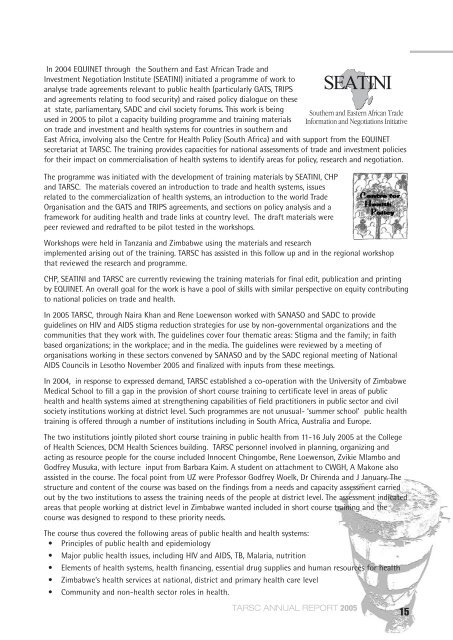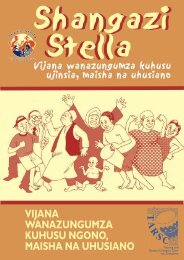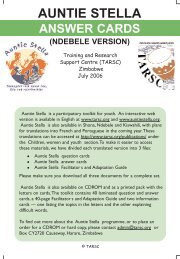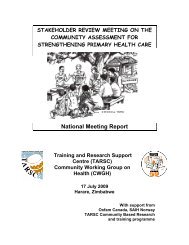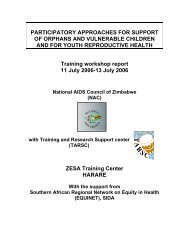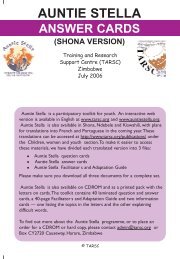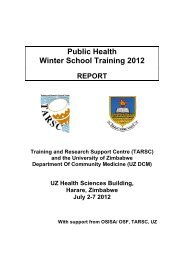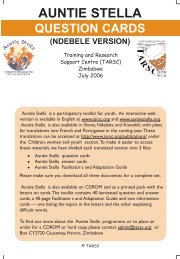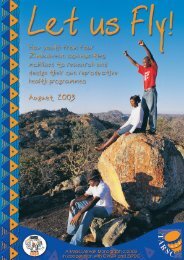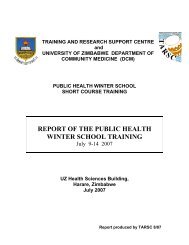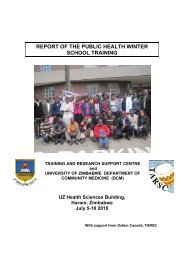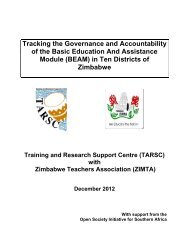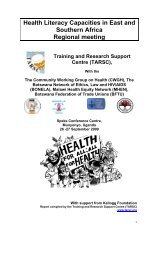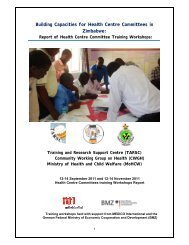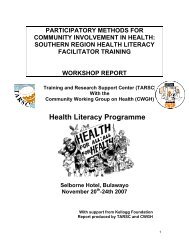TARSC Annual Report 2005 - Training and Research Support Centre
TARSC Annual Report 2005 - Training and Research Support Centre
TARSC Annual Report 2005 - Training and Research Support Centre
Create successful ePaper yourself
Turn your PDF publications into a flip-book with our unique Google optimized e-Paper software.
In 2004 EQUINET through the Southern <strong>and</strong> East African Trade <strong>and</strong><br />
Investment Negotiation Institute (SEATINI) initiated a programme of work to<br />
analyse trade agreements relevant to public health (particularly GATS, TRIPS<br />
<strong>and</strong> agreements relating to food security) <strong>and</strong> raised policy dialogue on these<br />
at state, parliamentary, SADC <strong>and</strong> civil society forums. This work is being<br />
used in <strong>2005</strong> to pilot a capacity building programme <strong>and</strong> training materials<br />
on trade <strong>and</strong> investment <strong>and</strong> health systems for countries in southern <strong>and</strong><br />
East Africa, involving also the <strong>Centre</strong> for Health Policy (South Africa) <strong>and</strong> with support from the EQUINET<br />
secretariat at <strong>TARSC</strong>. The training provides capacities for national assessments of trade <strong>and</strong> investment policies<br />
for their impact on commercialisation of health systems to identify areas for policy, research <strong>and</strong> negotiation.<br />
The programme was initiated with the development of training materials by SEATINI, CHP<br />
<strong>and</strong> <strong>TARSC</strong>. The materials covered an introduction to trade <strong>and</strong> health systems, issues<br />
related to the commercialization of health systems, an introduction to the world Trade<br />
Organisation <strong>and</strong> the GATS <strong>and</strong> TRIPS agreements, <strong>and</strong> sections on policy analysis <strong>and</strong> a<br />
framework for auditing health <strong>and</strong> trade links at country level. The draft materials were<br />
peer reviewed <strong>and</strong> redrafted to be pilot tested in the workshops.<br />
Workshops were held in Tanzania <strong>and</strong> Zimbabwe using the materials <strong>and</strong> research<br />
implemented arising out of the training. <strong>TARSC</strong> has assisted in this follow up <strong>and</strong> in the regional workshop<br />
that reviewed the research <strong>and</strong> programme.<br />
CHP, SEATINI <strong>and</strong> <strong>TARSC</strong> are currently reviewing the training materials for final edit, publication <strong>and</strong> printing<br />
by EQUINET. An overall goal for the work is have a pool of skills with similar perspective on equity contributing<br />
to national policies on trade <strong>and</strong> health.<br />
In <strong>2005</strong> <strong>TARSC</strong>, through Naira Khan <strong>and</strong> Rene Loewenson worked with SANASO <strong>and</strong> SADC to provide<br />
guidelines on HIV <strong>and</strong> AIDS stigma reduction strategies for use by non-governmental organizations <strong>and</strong> the<br />
communities that they work with. The guidelines cover four thematic areas: Stigma <strong>and</strong> the family; in faith<br />
based organizations; in the workplace; <strong>and</strong> in the media. The guidelines were reviewed by a meeting of<br />
organisations working in these sectors convened by SANASO <strong>and</strong> by the SADC regional meeting of National<br />
AIDS Councils in Lesotho November <strong>2005</strong> <strong>and</strong> finalized with inputs from these meetings.<br />
In 2004, in response to expressed dem<strong>and</strong>, <strong>TARSC</strong> established a co-operation with the University of Zimbabwe<br />
Medical School to fill a gap in the provision of short course training to certificate level in areas of public<br />
health <strong>and</strong> health systems aimed at strengthening capabilities of field practitioners in public sector <strong>and</strong> civil<br />
society institutions working at district level. Such programmes are not unusual- ‘summer school’ public health<br />
training is offered through a number of institutions including in South Africa, Australia <strong>and</strong> Europe.<br />
The two institutions jointly piloted short course training in public health from 11-16 July <strong>2005</strong> at the College<br />
of Health Sciences, DCM Health Sciences building. <strong>TARSC</strong> personnel involved in planning, organizing <strong>and</strong><br />
acting as resource people for the course included Innocent Chingombe, Rene Loewenson, Zvikie Mlambo <strong>and</strong><br />
Godfrey Musuka, with lecture input from Barbara Kaim. A student on attachment to CWGH, A Makone also<br />
assisted in the course. The focal point from UZ were Professor Godfrey Woelk, Dr Chirenda <strong>and</strong> J January. The<br />
structure <strong>and</strong> content of the course was based on the findings from a needs <strong>and</strong> capacity assessment carried<br />
out by the two institutions to assess the training needs of the people at district level. The assessment indicated<br />
areas that people working at district level in Zimbabwe wanted included in short course training <strong>and</strong> the<br />
course was designed to respond to these priority needs.<br />
The course thus covered the following areas of public health <strong>and</strong> health systems:<br />
• Principles of public health <strong>and</strong> epidemiology<br />
• Major public health issues, including HIV <strong>and</strong> AIDS, TB, Malaria, nutrition<br />
• Elements of health systems, health financing, essential drug supplies <strong>and</strong> human resources for health<br />
• Zimbabwe’s health services at national, district <strong>and</strong> primary health care level<br />
• Community <strong>and</strong> non-health sector roles in health.<br />
<strong>TARSC</strong> ANNUAL REPORT <strong>2005</strong><br />
15


